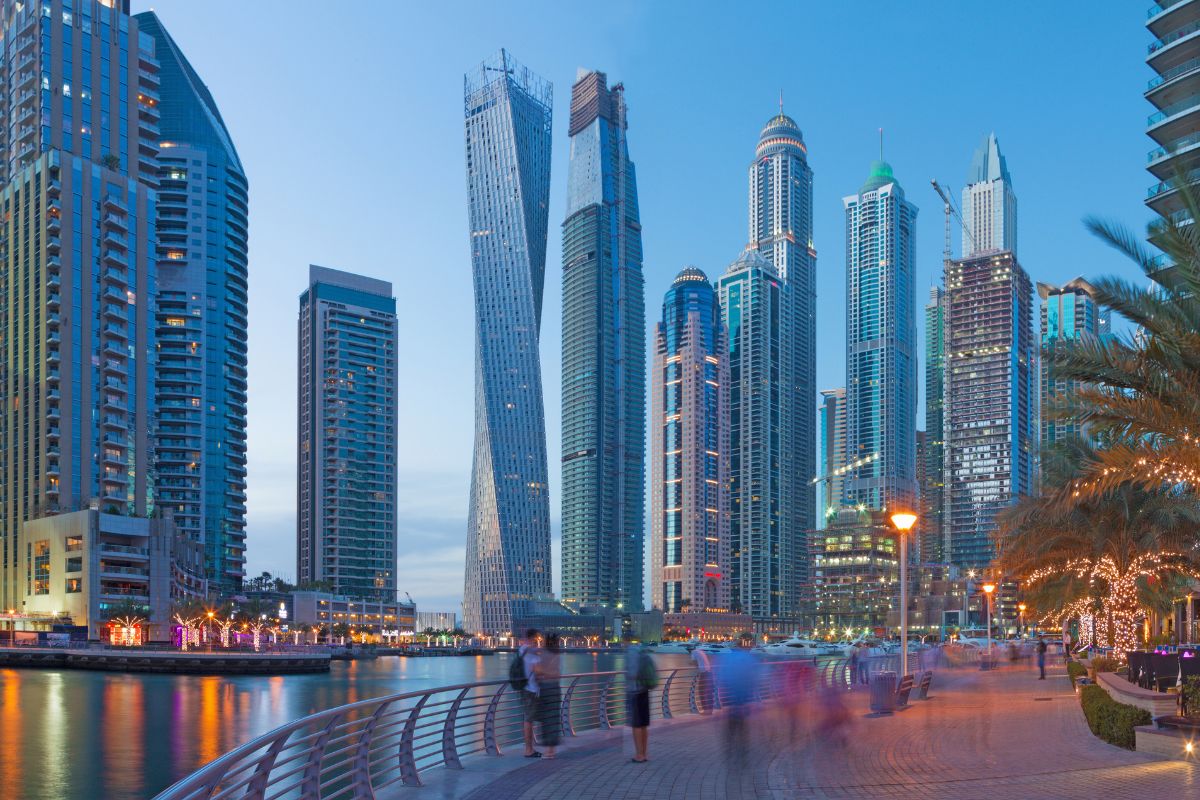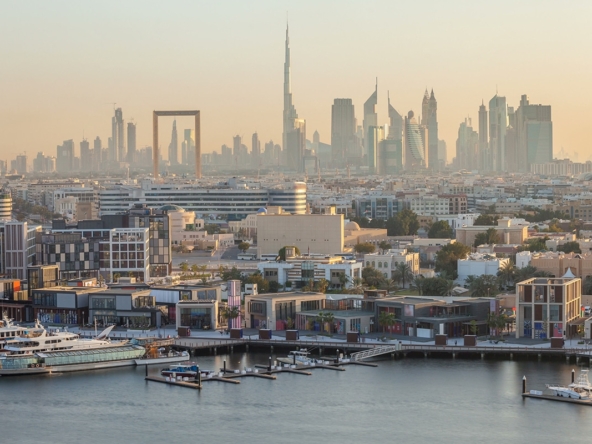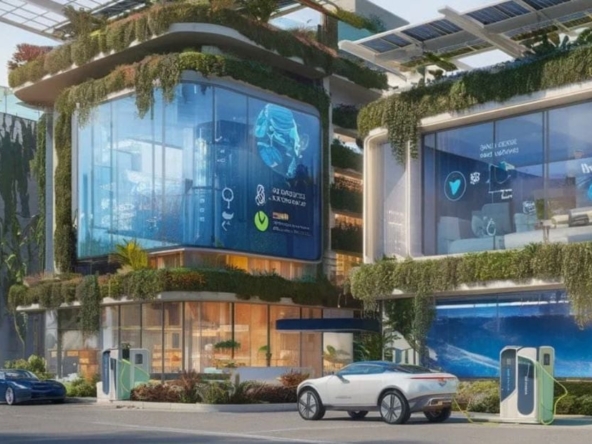Drawn by low taxes, high returns, safety and its status as an international transit hub, the city of skyscrapers – Dubai – has registered rising interest from global investors, including Indian high net worth individuals (HNIs). Since 2021, Dubai’s property market has recorded a consistent rise in the average value of residential property transactions, including villas and apartments.
To quote recent data from a report by property consultancy Knight Frank, the total number of homes available for sale across Dubai’s prime markets fell by 47% during the first six months of 2024, as prime residential property prices grew by 7%.
The report also highlighted that 190 homes priced at over $10 million were sold in Dubai during the first half of the year, positioning it as the most active luxury homes market globally, ahead of New York (130) and Miami (102).
However, despite the surge in prices, Dubai remains one of the most affordable luxury real estate markets globally. As per Knight Frank’s 2024 Wealth Report, $1 million secures approximately 980 square feet of prime residential space in Dubai, compared to 366 square feet in New York, 355 square feet in London, 1,109 square feet in Mumbai and just 172 square feet in Monaco.
This affordability, in addition to other factors such as ease of property purchase, favourable visa and mortgage policies, tax benefits, high rental yields and capital value appreciation, among others, have turned Dubai into a sought-after destination in recent years. So, if you’re looking to invest in a property in Dubai, here’s a detailed primer to get you started.
Legal mandates
Investment in real estate overseas, including Dubai, by a resident Indian is governed by two key regulations, namely Foreign Exchange Management Act, 1999, and Income Tax Act, 1961.
As per FEMA regulations, a resident individual can remit upto $ 2,50,000 (about ₹2.1 crore) per financial year under the Liberalised Remittance Scheme for purchase of immovable property. The said limit is for an individual, therefore a family looking to buy a bigger property can remit the funds in larger amounts by utilising their combined individual limits.
It must however be noted that borrowed funds or bank loans are not allowed for such remittances. Albeit, family members can gift funds to each other and remit them under LRS, which is permissible.
“All income directly earned from such property is taxable in India. This includes rental income or capital gains,” highlighted Dhruv Chopra, who is a Managing Partner at Dewan P N Chopra & Co.
Purchase and registration
According to real estate stakeholders, property purchase is a rather smooth exercise in Dubai. All one requires to get started is a set of documents including passport, visa, proof of income, recent bank statements, no-objection certificate from the developer, purchase agreement, payment information and the seller’s identity proof.
“Foreigners can buy freehold properties in designated areas. (without a residence visa). There is no need for a local sponsor,” said Akash Puri, Director – International, India Sotheby’s International Realty. He added that there is a 4% Dubai Land Department (DLD) registration fee applicable and mortgages are available to foreigners, however the terms depend on the buyer’s residency status and credit history.
“In contrast, Abu Dhabi primarily allows foreign ownership through leasehold arrangements in specific areas like Al Reem Island and Saadiyat Island, where properties are leased for up to 99 years,” highlighted Manoj Dharmani, CEO, DUDigital Global Ltd.
The DLD updates freehold areas on a yearly basis. Some localities in this bracket include The Palm Jumeirah, Downtown Dubai, Burj Khalifa, Dubai Marina, Emirates Hills, Bartha Heights, Business Bay and Blue Water Island.
Preferred neighbourhoods and pricing
Sectoral experts listed Downtown Dubai and Palm Jumeirah are the top luxury residential areas in the city. Meanwhile Dubai Marina and Jumeirah Beach are popular amongst expatriates and professionals.
Puri highlighted that emerging areas like Dubai Hills Estate and Dubai Creek Harbour are also gaining traction for their modern infrastructure and future growth potential.
“High-net-worth individuals seek prime properties, especially in areas like Palm Jumeirah, Business bay, and Emirates Hills. These buyers often purchase villas or penthouses in exclusive neighborhoods, with prices reaching millions of dollars,” said Rizwan Sajan, Founder and Chairman, Danube Group.
Sajan added that middle-income buyers and investors look for properties in more affordable but well-developed areas such as Jumeirah Village Circle, JVT, and Dubai Maritime city. This segment is interested in high-quality apartments and townhouses that offer good rental yields and capital appreciation.
Meanwhile the first-time buyer segment consists of young professionals and expatriates looking for affordable homes or investments. Areas such as Al Furjan, Dubai Silicon Oasis, and Arjan are popular among these buyers, offering a balance of affordability and lifestyle amenities.
According to data sourced from property consultancy JLL, the approximate per square feet property price in Jumeirah Golf Estate and Arabian Ranches presently range between ₹41,196 – 45,774. In Dubai Hills, it stands at ₹36,619 – 45,774 per square feet.
In the upscale localities of Emirates Hill and Palm Jumeirah prices per square feet vary between ₹57,217 – 68,661 and ₹1,02,991 – 1,19,012, respectively.
Overall, the average home price in Dubai is about $7,60,000 ( ₹63.88 crore), per JLL. The real estate cost however depends on the property’s location, the construction stage, the living area, the finish quality, as well as the facilities of the residential complex, said Ritesh Mehta, Senior Director, and Head (North and West), residential services and developer initiative, JLL India.
Capital appreciation and rental yields
According to a Knight Frank report, residential property values across Dubai grew 21.3% year-on-year, and 5.3% quarter-on-quarter in the April-June period of 2024. Prime residential values, which encompass the neighbourhoods of Palm Jumeirah, Emirates Hills, Jumeirah Bay Island, and Jumeirah Islands rose by 7% annually during the first half of the year.
Apartment prices stood 20.7% higher compared to Q2 of 2023, while villas experienced a 24.3% price increase over a 12-month period at the end of the quarter ended June 2024.
During Q1 2024, the total number of homes available for sale across Dubai’s prime markets increased by 21.4%, reflecting the increase of under-construction residential projects over the last 3 months.
A total of 261,243 units were under construction during the first quarter, due to be completed by 2029. Knight Frank estimates apartments to account for 80% of the tally.
“The performance of the Indian rupee against the UAE dirham has influenced buying patterns at times,” pointed out JLL’s Mehta.
Meanwhile rental yields, experts said range between 5-8%, which is nearly double the prevailing yields in top metro cities of India.
According to a report by real estate consultant Anarock, during the January – March quarter of 2024, Bengaluru recorded the highest rental yield across the top seven cities in India. Mumbai registered a rental yield of 4.15% and Gurugram clocked 4.1% during the three-month period.
Taxation and visa programs
Amongst some of the most appealing factors for property buyers, Dubai offers a tax-free environment on personal income and capital gains, which is highly attractive to Indian investors accustomed to higher tax rates.
Furthermore, owning property in the city can lead to eligibility for a Golden Visa. However, certain conditions must be fulfilled. “To qualify for the Golden Visa, individuals must invest at least AED 2 million (about ₹5 crore) in real estate or approved investments,” underscored Dharmani.
The Golden Visa is a long-term, renewable residence visa for 5-10 years, which enables foreigners to live, work and study in the UAE while enjoying certain exclusive benefits.
Source Link…



